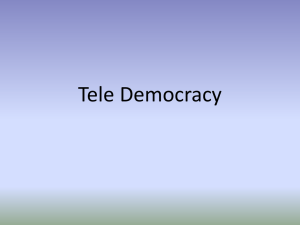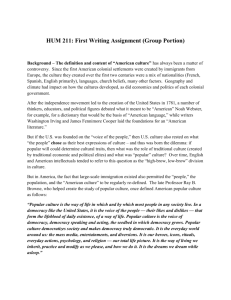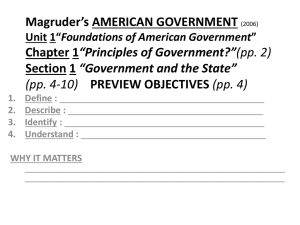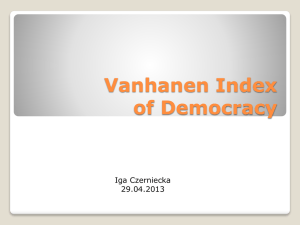Opening ceremony for `Youth for Democracy` Implemented by the
advertisement
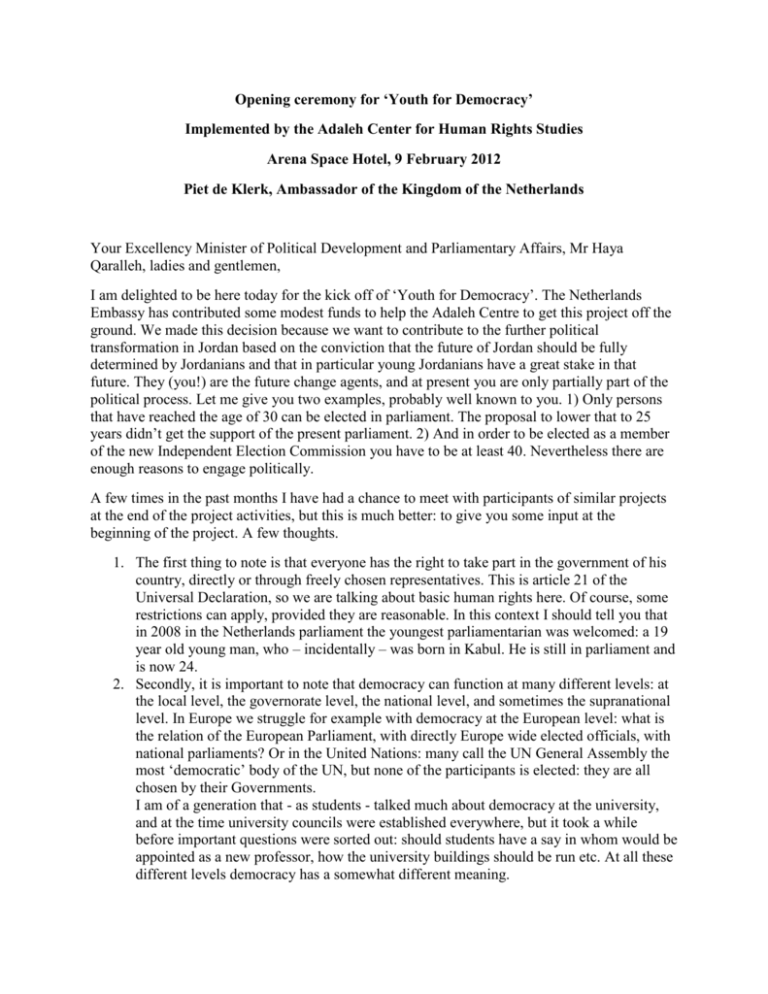
Opening ceremony for ‘Youth for Democracy’ Implemented by the Adaleh Center for Human Rights Studies Arena Space Hotel, 9 February 2012 Piet de Klerk, Ambassador of the Kingdom of the Netherlands Your Excellency Minister of Political Development and Parliamentary Affairs, Mr Haya Qaralleh, ladies and gentlemen, I am delighted to be here today for the kick off of ‘Youth for Democracy’. The Netherlands Embassy has contributed some modest funds to help the Adaleh Centre to get this project off the ground. We made this decision because we want to contribute to the further political transformation in Jordan based on the conviction that the future of Jordan should be fully determined by Jordanians and that in particular young Jordanians have a great stake in that future. They (you!) are the future change agents, and at present you are only partially part of the political process. Let me give you two examples, probably well known to you. 1) Only persons that have reached the age of 30 can be elected in parliament. The proposal to lower that to 25 years didn’t get the support of the present parliament. 2) And in order to be elected as a member of the new Independent Election Commission you have to be at least 40. Nevertheless there are enough reasons to engage politically. A few times in the past months I have had a chance to meet with participants of similar projects at the end of the project activities, but this is much better: to give you some input at the beginning of the project. A few thoughts. 1. The first thing to note is that everyone has the right to take part in the government of his country, directly or through freely chosen representatives. This is article 21 of the Universal Declaration, so we are talking about basic human rights here. Of course, some restrictions can apply, provided they are reasonable. In this context I should tell you that in 2008 in the Netherlands parliament the youngest parliamentarian was welcomed: a 19 year old young man, who – incidentally – was born in Kabul. He is still in parliament and is now 24. 2. Secondly, it is important to note that democracy can function at many different levels: at the local level, the governorate level, the national level, and sometimes the supranational level. In Europe we struggle for example with democracy at the European level: what is the relation of the European Parliament, with directly Europe wide elected officials, with national parliaments? Or in the United Nations: many call the UN General Assembly the most ‘democratic’ body of the UN, but none of the participants is elected: they are all chosen by their Governments. I am of a generation that - as students - talked much about democracy at the university, and at the time university councils were established everywhere, but it took a while before important questions were sorted out: should students have a say in whom would be appointed as a new professor, how the university buildings should be run etc. At all these different levels democracy has a somewhat different meaning. 3. A fundamental distinction is direct democracy versus democracy through elected representatives. The first you can have mostly in smaller units: in local associations or perhaps in tribal settings. At the national level one needs representatives; these days there is a lot of talk about parliamentary democracy in Jordan, interestingly enough both by speakers who argue that Jordan at present is not yet a parliamentary democracy and speakers who argue that – of course – Jordan IS a parliamentary democracy. It is a fact that Jordan has a parliament, but where you stand in this debate depends on the limits you accept for parliament as the body that ultimately decides political matters in the country. After all: democracy means that it is the demos that rules: the collective of citizens with equal rights. 4. Fourthly: essential for democracy is dialogue and debate. Arguments should be decisive. And when the debates are between elected representatives, it is essential too that they are held as much as possible in the open, so that the press and the electorate can follow these debates. In Jordan strong loyalties exist traditionally between people, often people of a tribe and/or persons from a particular region. That is often considered more important than the political concepts such a person is willing to defend. For example, someone said: “I am fighting in parliament for more money for my city”, but when I asked on which basis he defended more money for his town there was no answer, at least not an answer that made clear how finances should be distributed over the different regions. There is an interesting parallel between the present situation in Jordan and the situation that existed in the Netherlands until a few decades ago. One can say that Jordan is still to some extent compartmentalized: divided in regions, divided in tribes. In a similar way Dutch society was compartmentalized in a protestant ‘tribe’ (or pillar), a catholic tribe, a socialist tribe and – to some extent – a liberal tribe. The Dutch situation may have a more direct parallel to Lebanon, but also the comparison with Jordan is instructive because it was considered better that have debates first in your own circle, where you had all something in common – a common worldview. It was only at the top that the different ‘tribes’ met and divided the political positions at the different institutions among themselves. If that comparison applies, the lesson is also that such compartmentalization disappears only slowly over time, and that sometimes new dividing lines appear. I will limit myself to these four points. You will hopefully discover much more during the project in which you will have an active role. We live in exciting and sometimes dangerous times. The key is that everyone, young and old, is being taken seriously as a player in the public domain, as a citizen, with his or her civil and political rights, with his or her dignity. That is what this third Arab Awakening is all about. The first round was at the end of the Ottoman period when Arab countries started their path towards democracy, be it with limitations. The second wave, in the decade after the Second World war started as an effort to get rid of the remnants of foreign domination, but with a strong influence of the military – an influence that in most republican situations led to family dictatorships. And now we witness the third wave, the Arab Spring, this difficult path to greater democracy. Your role in that third phase is important and I hope this project can help steer the course and that - from time to time - the Netherlands can help in this process. We would be happy to facilitate thinking about the substance of democracy among young Jordanians and stimulate exchanging ideas among young political actors. But let’s have this project first!




![“The Progress of invention is really a threat [to monarchy]. Whenever](http://s2.studylib.net/store/data/005328855_1-dcf2226918c1b7efad661cb19485529d-300x300.png)

